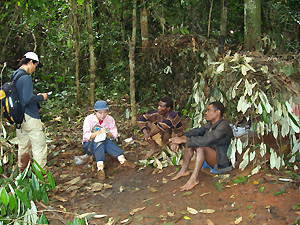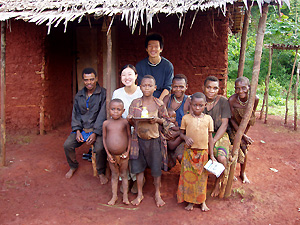| Period: 4 August - 2 September 2004. Country: Cameroon |
| |
Purpose of the Visit |
| |
Field Research and On-Site Education in Cameroon |
| |
ICHIKAWA Mitsuo (ASAFAS: Division
of African Area Studies) |
| |
Outcome
and Progress Report |
| |
- (1) Preliminary research on bush meat hunting and on-site education
- Bush meat hunting has recently become a controversial issue from the perspective of conservation in
the central African forest region, since it allegedly depletes wildlife, resulting in what is termed 'empty forest syndrome'. Reliable data on bush meat hunting and
trading are, however, not yet available. In order to provide the basic data for ensuring sustainable livelihood hunting by the local inhabitants, preliminary research
was conducted on bush meat hunting and trading in Northern and Eastern Provinces of Cameroon, particularly in the areas around Benoue National Park and the proposed
Boumba-Bek and Nki National Parks.
The preliminary survey and on-site education were conducted in the Deng-Deng area in Eastern Province, and Garoua, Tcholire and other areas around Benoue National Park
in Northern Province, where YASUDA Akito, a graduate student of ASAFAS, is planning to begin research on the relationships of the local people with the nature conservation projects.
We also visited Malea Ancien, a village in Yokadouma District, Eastern Province, and had discussions with HATTORI Shiho, another ASAFAS student staying there, on her ethnobotanical
research on the Baka hunter-gatherers. She is particularly interested in the process of acquisition of knowledge regarding forest plants and in variations between individuals on such
knowledge. In addition, we spent a few days at the Ndongo Field Station, and had talks with Prof. SATO Hiroaki of Hamamatsu University of Medicine and Dr. YAMAUCHI Taro of the Graduate
School of Medicine, the University of Tokyo, who were conducting nutritional and physiological studies on the Baka hunter-gatherers, on various problems concerning the research and
maintenance of the station.
- (2) Exchange of information with related organizations
- We visited the WWF - Cameroon headquarters in Yaounde, and had discussions with Dr. Leonard Usongo, the project
coordinator of the Jengi Project, on cooperation and information exchanges concerning research and conservation activities in Eastern Province, and agreed to hold a joint workshop
some time in early 2005 (the workshop was actually held in February, 2005; see Cameroon Field Station HP for the details.)
In Garoua, Northern Province, we met Dr. Assan Gomse, Conservateur at MINEF, to get information on conservation activities
in Benoue National Park and its surrounding areas. Upon our return to Yaounde, we visited the regional office of CIFOR at Nkolbisson, and met Mr. Tieguhong Julius to inquire about its
activities, and possible cooperation with us concerning the livelihood of the forest peoples in Cameroon.
Other persons we met during our stay in Cameroon included Dr. Mathias Heinze, a GTZ (Germany) officer responsible for the
Eastern Region, and Dr. Daou Veronique Joiris of the Department of Cultural Anthropology, ULB, Belgium, both of whom are specialists in the social aspects of forest conservation.
|
| |
On the Situation of the Cameroon FS |
| |
Research and educational activities in Cameroon have been greatly enhanced by the establishment of the
Field Station. There are two ASAFAS students currently carrying out field research in this region, and three others are planning to visit Cameroon for field research in
the latter half of FY2004. The Field Station is also being used by researchers and students from other Japanese universities, such as Hamamatsu University of Medicine, the
University of Tokyo, Kobe-Gakuin University, Yamanashi Unversity, and Toyama University, and serves as a joint research base for these researchers. We hope to further
strengthen the function of the field station, which is such an important research base in Cameroon.
We also maintain cooperative relationships with conservation-related organizations in Cameroon, and plan to hold a workshop on the forest peoples in the proposed national park
areas in the latter half of FY2004. The workshop is being jointly organized by the Kyoto University Cameroon Field Station, MINEF and WWF-Cameroon, with the participation of
researchers from University of Yaounde I, GTZ, National Herbarium and other related organizations.
|
 |
|
 |
| HATTORI Shiho and YASUDA Akito (both ASAFAS students) interview Baka men at a forest camp. |
|
In front of HATTORI's (ASAFAS) house at Malea Ancien village |
|
|
 Report
Report